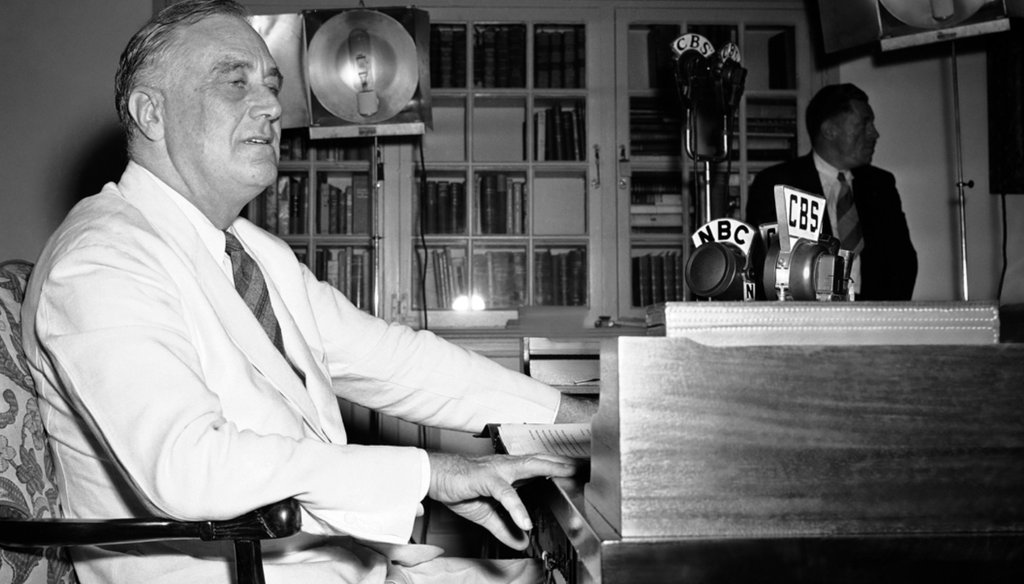Get PolitiFact in your inbox.

President Franklin D. Roosevelt is pictured as he made his Labor Day broadcast from the Franklin D. Roosevelt library in Hyde Park, New York. (AP)
If Your Time is short
• In context, Biden’s remark during the first presidential debate appeared to be sarcastic.
• The discussion inspired us to turn to historians to find out what U.S.-Nazi Germany relations were actually like in the run-up to World War II.
During the final 2020 presidential debate, President Donald Trump boasted that he had eased tensions on the Korean Peninsula by maintaining a good relationship with the nation’s leader Kim Jong Un.
"North Korea, we’re not in a war, we have a good relationship," Trump said. "You know, people don’t understand — having a good relationship with leaders of other countries is a good thing."
Joe Biden shot back: "That's like saying we had a good relationship with Hitler before he in fact invaded Europe."
You can watch the exchange here.
The first three words are hard to hear as the moderator and Trump talk over Biden. But the confusing moment generated plenty of discourse by people who riffed off of what they thought they heard Biden say.
"Biden just said we had a good relationship with Hitler," wrote a Twitter user. "This guy is straight-up senile."
On Facebook, a website called TheConservativeOpinion.com put the latter part of Biden’s comment as a headline in a similar way: "Biden claims ‘we had a good relationship with Hitler before he invaded the rest of Europe.’" The story included a similarly worded tweet from CBS News.
In context, Biden, the Democratic presidential nominee, was making a sarcastic analogy about the danger of maintaining good relationships with dictators. He was posing a hypothetical by suggesting Trump was wrong to want to have a good relationship with Kim, just like it would have been wrong to want to have a good relationship with Adolf Hitler, the German dictator and leader of the Nazi Party.
But even an NBC News debate night blog that noted Biden intended sarcasm omitted the words "That’s like saying," when quoting the former vice president.
We see no indication Biden was speaking literally. But the discussion inspired us to turn to historians to find out what U.S.-Nazi Germany relations were actually like before the two powers had declared war on each other.
They told us that the United States’ relationship with Hitler in the run-up to the invasion of Europe was complex and difficult to characterize in either good or bad terms.
According to Paul Kennedy, a Yale professor of history and international security studies, the U.S. and Nazi Germany had a formal relationship of neutrality, even up until Hitler’s declaration of war on the U.S. in December 1941.
"We were technically ‘appeasers,’ like Chamberlain, Stalin, Canada for a very long while," Kennedy wrote in an email. "It’s a complicated story."
Hitler and U.S. President Franklin Delano Roosevelt both came to power in 1933. Roosevelt and members of his inner circle loathed the Nazis, Kennedy said. Nevertheless, they shied away from overtly supporting Britain and France to avoid antagonizing Americans who wanted the country to stay abreast of European conflicts after the ravages of World War I and the Great Depression.
Max Paul Friedman, a professor of history and international relations at American University, said that it wouldn’t be accurate to say that relations between Nazi Germany and the U.S. were "good," because Roosevelt did take steps to chastise Germany even before the invasion of Europe.
In October 1937, Roosevelt gave the so-called "Quarantine Speech," calling for the isolation of aggressor nations. Even though Roosevelt did not name who these aggressors were, it was widely interpreted that he was referring in part to Germany. In response to the state-sponsored pogrom against Jews known as Kristallnacht, Roosevelt expressed his shock and recalled U.S. ambassador Hugh Wilson from Berlin.
However, Friedman wrote, "some Americans…had good relations with Hitler before the war, including some with pro-Nazi leanings who joined the isolationist movement known as America First."
After Hitler invaded the rest of Europe, relations between the two countries worsened, leading to a state of undeclared naval conflict by the time the U.S. officially entered World War II in December 1941.
Our Sources
A tweet, Oct. 22, 2020
Axios, tweet, Oct. 22, 2020
Interview with Max Paul Friedman Oct. 23, 2020
Interview with Paul Kennedy, Oct. 23, 2020
Miller Center, October 5, 1937: Quarantine Speech


























